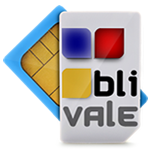When traveling, connectivity is essential. Whether it’s a business trip or a weekend getaway, staying connected allows us to navigate, communicate, and plan our activities. However, many of us face a common choice: use public Wi-Fi hotspots or opt for a SIM card or eSIM. In this article, we explore the risks associated with public Wi-Fi hotspots and the benefits of choosing more secure solutions like SIM cards and eSIMs, like those offered by BLIVALE.
Risks of Public Wi-Fi Hotspots
Public Wi-Fi hotspots may seem convenient, but they come with many pitfalls. Here are some of the main risks you should consider when connecting to these networks.
Security Vulnerabilities
Public Wi-Fi networks are often vulnerable to various types of cyber attacks. Hackers can easily set up malicious hotspots with names that look like legitimate ones. This way, they can trick users into connecting to fraudulent networks, allowing them to steal sensitive data such as passwords, banking details, and personal information. Additionally, many of these networks do not use encryption, which makes the information easily accessible to anyone on the same network.
Attacchi Man-in-the-Middle
One of the most serious threats is Man-in-the-Middle (MitM) attacks. In this scenario, a hacker inserts himself between the user and the server they are trying to connect to. This allows the attacker to intercept the data being transmitted, harvesting personal information such as passwords and banking details. MitM attacks are especially common on public networks, where anyone can connect without adequate security controls.
Phishing and Identity Theft
Public Wi-Fi networks can also be used for phishing attacks. In these cases, hackers try to trick users into providing personal information through deceptive messages or fake websites. Connecting to these networks increases the risk of falling victim to such scams.
Spread of Malware
Another risk associated with using public hotspots is the spread of malware. Malicious hackers can exploit these connections to install malicious software on users' devices without their knowledge. This can lead to disastrous consequences, including the compromise of personal and financial data.
Other Potential Risks
Other risks include identity and password theft, shoulder surfing (where an attacker physically observes the user's actions), and the possibility of ransomware attacks. Public networks can be used to spread malware that blocks access to the user's files until a ransom is paid.
Advantages of Using SIM Card or eSIM
After examining the risks associated with public Wi-Fi hotspots, it is clear why more and more travellers are opting for SIM cards or eSIMs, such as those offered by BLIVALE.
Greater Security
Using a SIM card or eSIM offers a more secure connection than public hotspots. These options provide a private network that reduces the risk of cyber attacks and data theft. Local SIMs often offer competitive data plans that can be cheaper than expensive international roaming charges.
Reliable Access
SIM cards and eSIMs provide a continuous and reliable Internet connection, which is essential for using travel applications, digital maps and communications. You don't have to worry about interruptions or vulnerabilities associated with public networks. This is especially important when traveling, where having access to real-time information can make all the difference.
Ease of Use
eSIMs, in particular, allow you to activate local data plans without having to physically change your SIM card. This offers flexibility to travelers who frequently move between countries. You don't have to search for a store to buy a new SIM every time you cross a border; you can simply activate a plan online.
Warning Signs for Potentially Dangerous Public Wi-Fi Networks
Being aware of the signs of a potentially dangerous public Wi-Fi network can help you protect your data. Some signs to watch for include suspicious network names, unusual requests for personal information, and unstable connections.
Suspicious Network Name
If the network name (SSID) looks strange or similar to a legitimate network, it may be spoofed. Hackers often create networks with names similar to those of public places to trick users into connecting.
Weak or Unstable Connection
A public network with a very strong or unstable signal could be an indication of a malicious hotspot. Hackers can create networks with stronger signals to lure users.
Request for Sensitive Data
If the network asks for personal and sensitive information (such as credit card numbers or IDs) to connect, this is a clear warning sign. Legitimate networks should not ask for such data.
If you are thinking of going on a solo adventure, do not forget the importance of staying connected wherever you are. For internet connection and unlimited calls turn to BLIVALE where you can get unlimited internet and calls according to the destinations:
Whether it’s unlimited data or voice plans, BLIVALE guarantees free roaming anywhere in the world, no connection fee. Don’t let a lack of connection stop you; get ready to explore the world with freedom and spontaneity.
How a Man-in-the-Middle Attack Works on a Wi-Fi Network
Man-in-the-Middle attacks are a significant threat on public Wi-Fi networks. Understanding how they work can help you protect yourself.
Phases of a Man-in-the-Middle Attack
The first step in a MitM attack is intercepting communication. The attacker can create a fake access point or manipulate the ARP cache to insert themselves into the communication between two devices.
Once the attacker is in the middle of the communication, they can read and modify the data being transmitted. This includes everything from messages to sensitive credentials. After intercepting and potentially modifying the data, the attacker forwards the information to its original destination, allowing victims to believe that their communication is secure.
Consequences of a MitM Attack
The consequences can be serious. Identity theft and financial fraud are among the most common. Attackers can also use the access to install malware on victims' devices.
Common Public Wi-Fi Problems
In addition to security risks, using public Wi-Fi networks can lead to several practical inconveniences.
Frequent Disconnections
Public Wi-Fi networks can be unstable and lead to frequent disconnections. This is often caused by a large number of connected users or poor router configuration.
Slow Connection Speed
Public Wi-Fi speeds are generally slower than private connections. Network congestion can reduce the bandwidth available to each device.
Lack of Continuous Connection
Due to the unstable nature of public networks, users may experience service interruptions. This makes it difficult to maintain a continuous connection for activities that require stability, such as video calls or streaming.
Limitations on Use of Applications
Many public Wi-Fi networks do not allow the use of messaging or email applications. These restrictions may arise for security reasons or traffic management.
Why choose BLIVALE SIM Cards and eSIMs for your travels
When traveling abroad, using an international SIM card or eSIM is highly recommended, and in this context, the options offered by BLIVALE stand out for their convenience and security. Opting for an international SIM card or eSIM from BLIVALE allows you to have access to a secure and stable internet connection, avoiding the risks associated with public Wi-Fi hotspots. These solutions not only offer the flexibility to connect to local networks in various countries, but also guarantee better coverage and a higher quality of service.
BLIVALE ’s international SIM cards allow you to surf without worries, while eSIMs allow you to easily activate local data plans without having to physically change your SIM card. This particular feature is extremely useful for frequent travelers who move between different countries, as they can simply download a data plan directly to their device.
This way, you not only save on roaming costs, but you can also enjoy a faster and more secure connection, ideal for browsing, communicating and using essential applications during your trip. Choosing an international SIM card or eSIM from BLIVALE is therefore a smart decision for those who want to travel with peace of mind, without compromising their online security.
Conclusion
In conclusion, while public Wi-Fi hotspots may seem convenient, the associated risks justify using more secure solutions like BLIVALE SIM cards or eSIMs. Investing in a mobile data connection not only protects your data while traveling, but also provides you with a smoother and more reliable experience. Don’t let the convenience of public Wi-Fi hotspots compromise your online security. Opt for a BLIVALE SIM card or eSIM to ensure your data is protected while traveling.









